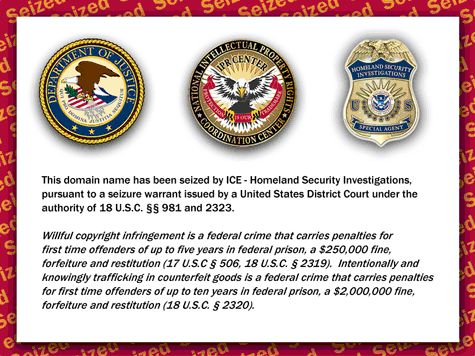The seizure of 82 domain names by The Department of Justice (DOJ) and Homeland Security’s Immigration and Customs Enforcement (ICE) was making headlines across the Internet in November. In particular, the seizure of the BitTorrent meta-search engine Torrent-Finder was seen as a particularly controversial move.
Torrent-Finder’s owner Waleed Gadelkareem was genuinely surprised by the actions of the US authorities and said earlier that he is determined to fight the seizure. He suspected that the authorities had made a mistake and hired a lawyer to help him with the legal proceedings.
Torrent-Finder’s lawyer David Snead called the seizure “a stretch of the law,” and today it became apparent just how far the law was stretched by the authorities. The application for the seizure warrant was just sent to us by Torrent-Finder’s owner and on first reading several painful mistakes stand out.
To start off the affidavit shows that the authorities worked closely with the MPAA, and the movie industry lobby group is cited multiple times to confirm various claims. In addition, a highly disputed MPAA study is used to signify the severity of movie piracy, despite the fact that it was called into doubt by the Government Accountability Office just a few months ago.
The general description of Torrent-Finder and the four music linking sites that were included in the affidavit are not completely accurate either. The sites are described by Homeland Security’s Special Agent Reynolds as being among the most popular of their kind, but in the case of Torrent-Finder.com we can easily list a few dozen BitTorrent sites that have more visitors.
This investigation has identified five linking, cyberlocker or Bit torrent websites that are among the most popular such websites on the internet for distributing illegal copies of movies, television shows, software and music files.
Aside from the fact that describing the site as one of the most popular of its type is a bit misleading, the core issue is whether Torrent-Finder is indeed a site which use is to distribute illegal copies of movies and music.
To make his case, agent Reynolds characterizes Torrent-Finder as a linking site, which generally “collect and catalog links to files on third party sites that contain illegal copies of copyrighted content, including movies, television shows, software and music.” This description doesn’t really seem to apply to Torrent-Finder.com.
Torrent-Finder does not catalog or collect any files, it simply allows people to search several torrent search engines or indexes. Also, these other torrent search engines do not host any copyrighted material either, but only torrent files that may or may not point to copyrighted content.
The message below is posted on the seized sites
Another claim from Homeland Security’s Special Agent Reynolds is that the news section on the site was another indication that Torrent-Finder was aiding criminal copyright infringement. He describes it as follows:
I was able to view posts by the user “Torrent Finder,” including “Top 10 Most Pirated Movies on BitTorrent,” “Piracy in The Music Industry,” “The First Episode of ‘The The Walking Dead’ Leaks to BitTorrent,” and “Piracy domain seizure bill gains support.”
This is interesting to say the least, because all these articles from the news section are in fact copies from articles that came from TorrentFreak and other sites. Torrent-Finder used our site as a news source and shared the articles with the users of the site.
From reviewing these posts by the user “Torrent Finder,” I learned that the above -referenced postings contained links and information to pirated movies including “Wall Street Never Sleeps,” “The Social Network,” “Red,” and other movies.
This appears to be another painful mistake. Not only have two of the four articles nothing to do with pirated content, the ones that do are news items that do not link to torrent files or any copyrighted files. A screenshot copy of our “Top 10 Most Pirated Movies on BitTorrent” article is nevertheless included as evidence in the affidavit.
Ironically, the “Piracy domain seizure bill gains support” article comes from CNET and covers the COICA law that would grant US authorities the power to seizure domains, in a similar fashion to what they did with Torrent-Finder.
ICE’s affidavit
The seizure application then continues to describe how the Torrent-Finder site works, and the “Downloads of Infringing Content via Torrent-Finder.com” is particularly interesting. Here, Special Agent Reynolds described how the site can be used to download torrent files from external sites.
Although the description itself is fairly accurate, the same section would also apply to every other search engine including Google and Bing. Downloading torrents via Torrent-Finder involves exactly the same steps as downloading torrents via a web search engine, nothing more nothing less.
Another part of the affidavit that stands out is the fact that the proposed seizure has not been carried out properly. According to the affidavit, the authorities should present the warrant to both the registrar (Godaddy) and the registry (Verisign). The registrar would then have to replace the domain name’s technical and administrative contacts with that of the authorities, but this never happened.
Although we’re not legal experts, in our opinion there were enough mistakes made in the affidavit to warrant an appeal against the seizure and get the domain transferred back to the original owner. In order to achieve this, Torrent-Finder’s owner is willing to put up a fight.
“My concern now is to get back my domain. Not because I do business with it, but because it was the first domain I bought and the first idea that I developed. It has been mine since then and I WILL NOT give it away because the USA government is testing a new bill,” Waleed said, referring to the COICA bill that would make such domain seizures standard procedure.
In the coming days Waleed and his lawyer will consider what steps to take next, and we expect that this will not be the last time we report on this unique case.







